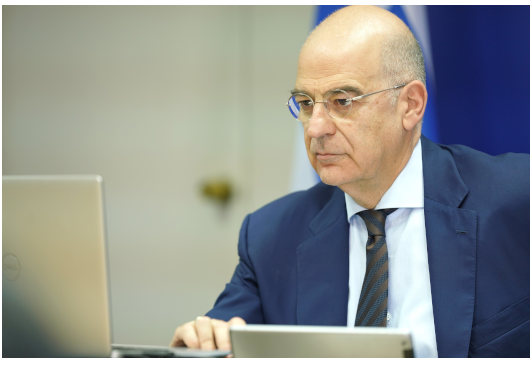 AL. KEFALAS: Minister, you are visiting France at a time when Turkey's threats in the region are multiplying. What do you expect from your visit to Paris?
AL. KEFALAS: Minister, you are visiting France at a time when Turkey's threats in the region are multiplying. What do you expect from your visit to Paris?
N. DENDIAS: It is a fact that Turkey has dangerously escalated its provocative stance in the Eastern Mediterranean. This is unacceptable. And it doesn't stop at violations of our national airspace and territorial waters — there are also flyovers of armed fighter jets above inhabited islands and Greek land areas at the Greek-Turkish border in Evros, in northern Greece. At the same time, Turkey is violating the sovereign rights and sovereignty of another EU Member State: the Republic of Cyprus. Turkey unhesitatingly carried out drilling not only in the EEZ, but also within Cypriot territorial waters. These actions resulted in condemnation by the EU, which imposed targeted sanctions. And there's more: This February, Ankara did not just threaten mass violation of European land borders, but almost succeeded, by instrumentalising migrants who were in a weak position, making them believe that the borders were open. The Turkish Minister of Interior circulated fake news, engaging on a campaign of misinformation, that the borders were supposedly open and that 130,000 people had crossed into Europe, when in reality they were actually a few dozen in number. The Turkish state news agency went above and beyond, publishing maps detailing less guarded routes. All this was added to the illegal and null agreement between Turkey and the government of Fayed el-Sarraj in Libya and its de facto involvement in the civil war in that country. In the context of its broader illegal effort to expand its sovereignty and its sovereign rights in the Eastern Mediterranean, Turkey is employing illegal methods to dispatch survey ships to the Greek continental shelf, attempting to dispute the continent shelf and to usurp Greek submarine resources. Our government will not allow this.
Greece particularly appreciates the consistent stance adopted by our friend and ally, France. From the very outset, Paris realised that Turkey's provocations do not only affect Greece and Cyprus, but all of Europe and the Mediterranean. Turkey cannot continuously attempt to extort Europe. At the military level, the presence of the French Navy and France’s participation in Operation IRINI in the region is sending a clear message: the rejection of international illegality.
AL. KEFALAS: Greece established an EEZ with Italy and is preparing to do the same with Egypt, a country you will be visiting soon. Why is this so important?
N. DENDIAS: My country aims at resolving pending issues with its neighbours to the benefit of peace, stability and prosperity for the peoples in the region. This agreement was concluded on the basis of the United Nations Convention on the Law of the Sea (UNCLOS). This Convention also confirms the right of islands to a continental shelf and an Exclusive Economic Zone, as set forth in Article 121. This right, which apllies throughout the world, is rejected by Turkey, which wishes to interfere in the region, in violation of International Law. Furthermore, the agreement we concluded with Italy is legitimate and can serve as an example for other states.
AL. KEFALAS: Following your meeting with the French Ministers of Foreign Affairs, do you expect closer cooperation between our two countries?
N. DENDIAS: Greek-French friendship and cooperation is particularly close, both at the bilateral level and at the EU level. Recently, France joined Greece, Cyprus, Egypt and the UAE in signing a joint declaration condemning Turkish illegal activities. I am very pleased that French support for Greece and Cyprus is perennial and unbreakable. Of course, our cooperation extends to many other areas, such as the coronavirus crisis, rebooting the European economy, bolstering tourism in both countries, or even defence cooperation. I am certain that we will continue to work closely, in a spirit of substantive European solidarity.
AL. KEFALAS: What do you expect from the European Council to be held on 19 June?
N. DENDIAS: The main subject of the European Council will be the creation of a new fund for the recovery of the European economy following the pandemic, as well as the Multiannual Financial Framework. This is a very important discussion that highlights the key issue of practical and substantive European solidarity.
AL. KEFALAS: What is your opinion regarding the EU development plan? And how does Greece intend to repay the EUR 32 billion it will receive?
N. DENDIAS: The European Commission's proposal is a step in the right direction and Greece has welcomed it. Furthermore, the initiative of President Macron and Chancellor Merkel was decisive and is consistent with the core principles of the European edifice, given that emergency situations require brave measures. It is my hope that the European Council will approve this plan. It is crucial that we reach an agreement for the economic reboot of Europe as soon as possible. After ten years of recession, my country, Greece, was on a dynamic growth track prior to the outbreak of the pandemic. Of course, this growth was derailed by circumstances, but the foundation and requirements for its reboot are firmly grounded and are a strong guarantee for growth. It is one of the key priorities of Kyriakos Mitsotakis’ government.
June 15, 2020


